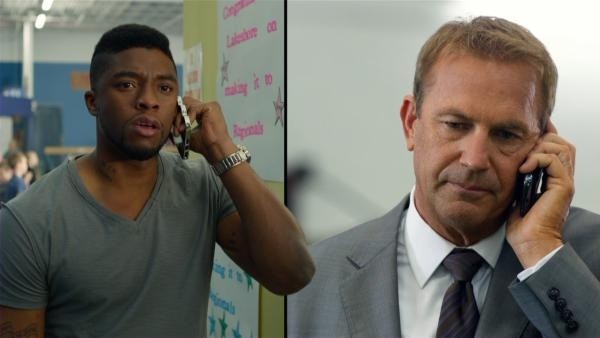 Jared is all about Mish-Mashing!
Jared is all about Mish-Mashing!
This whole month has been nuts, giving me very little time to get 5 posts a week up. Monday has been suffering, which I apologize for. But it may stay that way for the next few weeks so bear with me.
So what’s been going on in the world? Well, this past weekend was the worst box office frame of the year, ending an even worse summer. We’re down 20% in receipts from last year. Less and less people are going to see movies, and if they don’t figure out why and stop it, something bad is going to happen.
I recently watched the Jared Leto documentary, Artifact, about how his band sold 5 million albums, only to come home from their tour and be told by their label that they (the band) owed them (the label) 2 million dollars. The band tells them to eff off. The label then sues them for 30 million dollars. The documentary is about Jared and his group debating whether to release their next album independently in the midst of this lawsuit.
The doc is good, but it was a section near the middle that really got me. It covered the downfall of the music industry over the last couple of decades. Basically, everything was changing around the music business (most prominently, the move from physical to digital) and the people working at the music lables were too dumb to realize it in time. They watched as the entire world changed around them before doing anything, and by the time they did, it was too late. A company that previously knew nothing about music, was now taking all their money (iTunes). The labels now make half as much money as they did 15 years ago.
I often wonder – is the same thing happening to the movie industry? Like the music business, are we too slow to recognize the effects of the changes happening around us? Long-form media (television) with movie-like production value has pulled more and more writers away from the movie business, and now it’s pulling the talent too.
Indie movies are simultaneously debuting in both theaters and on Itunes, slowly moving towards a world where the indie producer skips the traditional distribution method and looks for ways to go straight to Itunes without having to pay a hefty cut to a third party.
Kickstarter is allowing filmmakers even more independence. If you’re a smart young director, you shoot a bunch of shorts, post them on Youtube, gain a following, get better, so that by the time your Kickstarter campaign begins for your feature, you have a kick-ass reel to show to inspire confidence from your investors. Ditto if you’re a writer. Learn how to direct and do the same.
I’m not saying the movie industry is screwed or anything. The international grosses are too big. But it doesn’t feel like the people in charge are moving fast enough to adapt, and they look out of touch in the process. The last time the movie business did something that actually made me want to go to the theater was adding the stadium seats. And that was 15 years ago. Itunes and Netflix intermittently come up with ways to make me want to use their services every month. They’re really staying on their toes – almost like they enjoy being cutting edge. I don’t get the sense that the studios are doing this at all.
The one thing the movie industry CANNOT do anymore is raise prices. When movies were under 10 bucks, I didn’t blink about seeing the latest movie each weekend. I’d even watch Step-Up 3 if it was the only thing playing. Why not? I love film and I don’t care how I’m entertained, as long as you entertain me. Now that I’m paying 18 dollars a film, I always calculate whether going to the theater is worth it. And many times the answer is no. In other words, there didn’t use to be a barrier to entry. Movies were priced in a way where you didn’t think twice about going. Now there’s a barrier, and you can’t put up a barrier at the very moment your business is losing 10% each year.
What’s the answer? I honestly don’t think it’s difficult. People crave something new. They think they want Spider-Man 2. But what they really want is a dancing tree. Until you show them the dancing tree, though, they’re never going to know they wanted it. Look, studios will always need their Transformers and their Fast and Furiouses. I get that. But each studio needs to set aside a division for taking risks, for trying out new things. Call it R&D. It’s the reason why Apple became the biggest company in the world. They knew if they didn’t allocate a bunch of money to trying out weird and new ideas, that they’d never grow, that people would eventually get bored of their products. I want to see some products that come out of the movie studios’ R&D divisions, not the cookie-cutter Teenage Mutant Ninja Electro Boogaloo nonsense I saw this summer. A decline of 20% in a year is your consumer telling you you need to work harder.
Speaking of R&D (if R&D stood for “really depressing”), I finally saw Draft Day last week. Now some of you might remember that Draft Day was the number 1 screenplay on the Black List a couple of years ago, a story that seemingly came out of nowhere (a sports script topping the Black List??? Unheard of!). I thought the script was worth the hype. It was a different kind of sports movie. It had urgency. It had mystery. No cliche last second touchdown. Really lived up to the hype in my opinion.
Now a lot of people ask me how a good script gets turned into a bad movie. Well, this would be how. Three crucial mistakes were made that doomed this great screenplay. First, the edgy gritty script (about football in Cleveland – one of the dirtiest grungiest cities in America) was given a romantic comedy color-popping scheme for reasons beyond logic. If you’re looking to grab your core audience, the football fan, you probably don’t want to shoot your movie to look like Dolphin Tale 2.
Second, Kevin Costner played the role all wrong. Like wrong wrong wrong. In the script, our hero was a guy who knew his job was on the line, who was desperate to do anything to help his team win. He had fire, he had energy. And you could SMELL the pressure on him in every scene. It was exciting watching this guy scramble for his life while pretending to have it together on the outside.
Costner, however, played the part like a sad disinterested IRS agent. Whenever he was approached by any character, he looked like he was going to shake his head, say “I give up,” then go take a nap. He sucked away every ounce of energy this character had with his performance. I felt horrible for the writers.
But the most critical mistake was a directing one. For those who haven’t seen the movie or read the script, a lot of it takes place over phone calls. Costner’s character is a general manager on Draft Day, and he’s calling everyone all over the country to figure out who he’s going to pick. Every 3rd scene was a phone scene. These intense mano-a-mano scenes, in many ways, defined the energy of the story.
So it was baffling when director Ivan Reitman decided to create split screens for all of the calls. But it wasn’t just that. It was that CLEARLY none of the actors were actually talking to each other during the shoot. For example, P. Diddy would shoot his half of a phone conversation and then two months later, Costner, talking to a stand-in, recorded his half of the conversation.
Because the actors weren’t actually talking to each other and because Reitman insisted on using split-screens (which meant no cutaways), there were these giant gaping moments of silence after each actor’s line. Costner: “I want to go with Bryant as our quarterback!” 1 Mississippi . 2 Mississippi. 3 Mississippi. Diddy: “Fuck you. He’s not good enough!” Imagine an entire day of conversations with people where, after you said your line, they waited three seconds before responding. That was every phone call in Draft Day.
And the funny thing is, I know what Reitman was thinking. He thought he’d use the split-screen to infuse energy into the calls – having both the actors right there on screen together battling it out. Ironically, it had the opposite effect. It locked him into a situation where he couldn’t cut for timing, and the dialogue just died on the screen as a result. It’s scary how easy it is to screw up a good script. I mean you know Costner, notorious for being a hands-on actor, lobbied to play this character as a slow tired broken down General Manager, despite it being completely wrong for the story. And what can you say when your lead actor tells you that’s how he’s going to play it? “No?” He’s just going to do it anyway. A great script down the tubes based on one bad decision made by an actor.
Luckily, I’m going to leave you with something that’ll blow your little screenwriting mind and make you forget all about the Costner! It’s the best article about suspense I’ve ever read, and the author, Lee Child (author of the Jack Reacher books) gives one of the best analogies about a writing tool I’ve ever read. Any attempt to summarize it would cheapen the article, so I’m going to let you read it yourselves.
And finally, thanks to everyone who contributed to this weekend’s Pitch Post. It was fun to see some of your pitches get so much love from the community. Did anyone tally the best five so we have some surefire amateur scripts to review? I tried to go in there a few times and count myself but got lost in the 900 posts!


